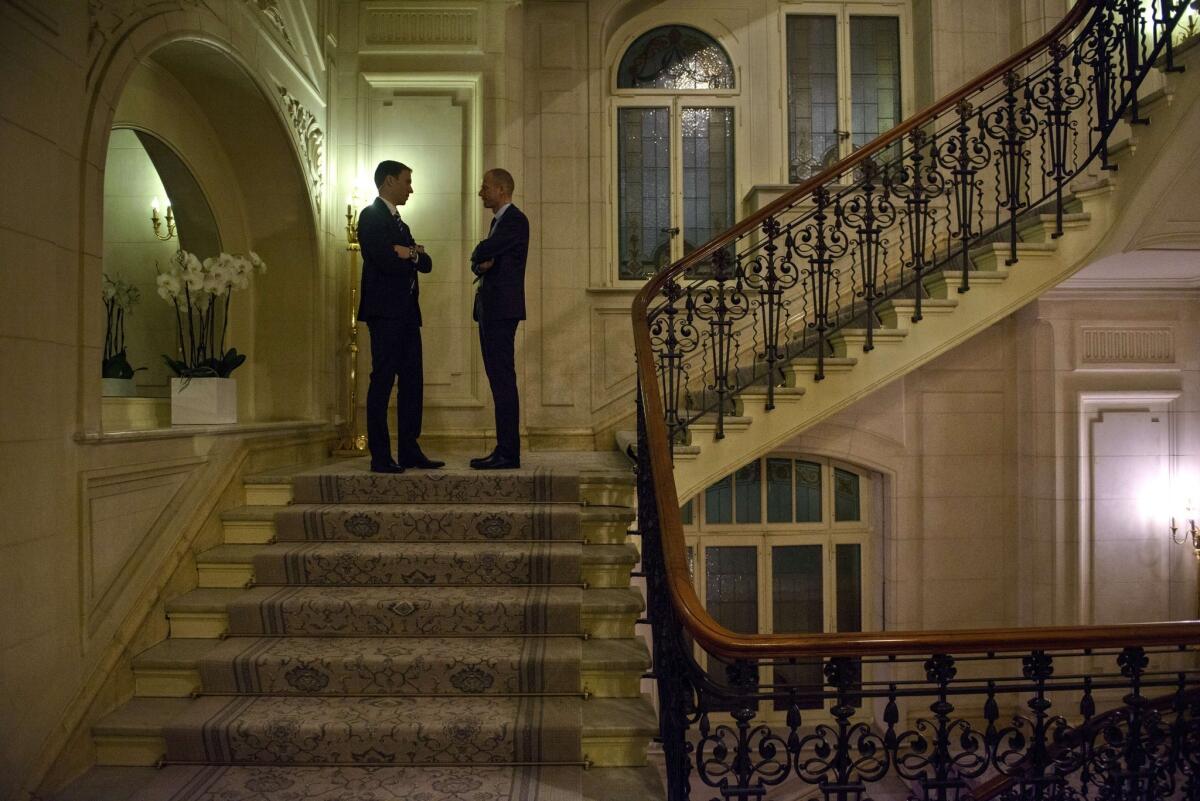Venue for Iran talks is a ‘gilded cage’ under constant surveillance

Security guards block a staircase at the Beau Rivage Palace Hotel in Lausanne, Switzerland, on March 28, during the Iran nuclear talks.
Reporting from Lausanne, Switzerland — When negotiators at the Iran nuclear talks in this gracious Alpine city wake up in the plush surroundings of the neo-baroque Beau Rivage Palace Hotel, they can gaze from their balconies at the inspiring sweep of Lake Geneva.
They had best take a good look. After a few moments, they’re obliged to rush down to a conference room with no windows or outside air where they sit, hour upon hour, debating fine points of uranium enrichment, banking sanctions and plutonium reprocessing.
Outside, the hotel has a spa, an indoor-outdoor pool, a red-carpeted tennis court, four restaurants and a swank bar usually haunted by Europe’s richest. But for all their access to the amenities in Lausanne, the negotiators might as well be in Cleveland.
“They’re in a gilded cage,” said Ali Vaez, an Iran expert with the International Crisis Group in Istanbul, Turkey, who has been attending Iran negotiations for years.
The eyes of the world are on the Beau Rivage this week, as representatives of Iran and six world powers seek to work out details of a preliminary agreement to curb Iran’s disputed nuclear program.
Their target for finishing is midnight Tuesday, although that deadline is self-imposed, and negotiators could extend it. The real deadline, at least for the U.S. delegation, is April 13, when Congress returns to work, planning to take up a bill that would impose new sanctions against Iran.
TV crews have captured Secretary of State John F. Kerry riding his bike around the lake and Iranian Foreign Minister Mohammad Javad Zarif taking walks along its shores. Such outings allow for fresh air and also, sometimes, an escape from the pervasive electronic eavesdropping that all parties involved in the talks -- as well as interested nations such as Israel -- are believed to conduct.
Most of the time, however, the negotiators and their staffs remain hunkered down indoors, laboriously talking.
One participant and his wife had a baby girl 18 months ago, but he has seldom seen his new daughter since, Vaez said. Another official said he had flown back and forth across the Atlantic more than 50 times since late 2013. Some U.S. officials were in Vienna, an earlier negotiation site, so often that they rented apartments.
At times, Iranian negotiators have had to work long hours even though they were fasting for religious holidays.
For all the luxury of the surroundings, “it’s a hard slog,” said Gary Samore, who took part in the talks as President Obama’s top nonproliferation advisor in the first term. That’s particularly true of negotiations with the Iranians, who are known for their haggling. Shifting positions at the last minute is seen as smart negotiating in Iran, but the approach drives many Americans crazy, Samore said.
The presumed constant surveillance heightens the claustrophobic tension. Negotiators assume practically all indoor conversations are targeted -- often by multiple spy services -- making even routine telephone calls a tense exercise in remembering what not to talk about. Sometimes the electronic traffic is so heavy, it’s not possible to make a phone call.
Last year, when talks were taking place in Vienna, a city that is a major United Nations center and was a spying headquarters during the Cold War, Iranians complained that they couldn’t make mobile phone calls because of the intensity of the electronic eavesdropping.
That was one reason for moving the current round of talks here -- a lakeside city that is slightly more detached from the constant intrigue. Another reason, though, was the boredom that sets in even amid the most luxurious surroundings.
For most of 2014, the talks were carried on in the Palais Coburg, a luxury boutique hotel built in Vienna in the 1800s by Prince Ferdinand of Saxe-Coburg and Gotha. It’s an establishment where every guest is greeted with a bottle of champagne.
But after months of talks, the fine buffet served day and night began to seem too familiar. Griping grew about the daily appearance of turkey schnitzel, the poultry variant of the deep fried national dish of Austria.
Early this year, diplomats moved -- in February to the posh Hotel President Wilson in Geneva, then to the Montreux Plaza Hotel at the east end of Lake Geneva in early March, then here in mid-March.
The Beau Rivage might have been a public relations blunder from the Iranian point of view. It was here that Western nations forced concessions on another Muslim power in the 1923 Treaty of Lausanne, which broke up the Ottoman Empire. (There’s a dispute about whether the treaty was actually drafted at another hotel, the Chateau d’Ouchy.)
It may be that the best way to get a deal is not to traipse through the best five-star hotels in Europe, but to sit negotiators down in boring, even grim, surroundings to focus their attention.
That’s what U.S. diplomat Richard Holbrooke did in 1995, when he forced the warring parties in the Bosnia-Herzegovina civil war to work out their differences at a drab airbase in Dayton, Ohio.
But Iran and the six world powers in the talks -- the U.S., Britain, China, France, Germany and Russia -- are happy with the security, convenience and comfort of the five-stars -- even if they rarely enjoy the luxury.
“There is a long diplomatic tradition in this,” Vaez said.
For more on foreign policy and the nuclear talks, follow @RichtPau on Twitter
More to Read
Sign up for Essential California
The most important California stories and recommendations in your inbox every morning.
You may occasionally receive promotional content from the Los Angeles Times.











